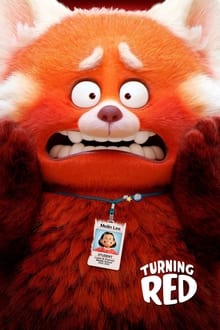
Pixar discovered anime and is looking to conquer the eastern box office.
I had some expectations regarding this film. I don't know exactly what I expected, but I think everyone will understand if I say that the film is signed by Disney and Pixar, two studios with an enviable track record of successes. However, as soon as the film ended, I felt that I wasn't exactly the target audience for this film: male, over thirty, European, with little connection with pop culture or the anime world.
The film follows a young teenager, daughter of Chinese parents, in a somewhat cathartic experience in which she transforms into a friendly red panda. The film focuses on this transformation and turns it into a metaphor for a transformation called puberty, a discovery of one's own individuality and autonomy, particularly with regard to the relationship with one's parents.
The film is good, but the theme is… complicated. If it is absolutely true that most teenage girls will see themselves in some of the adventures that Mei experiences, it is no less true that many parents and guardians will face the topic with discomfort and raise some objections regarding a certain “apology of rebellion” that the film suggests. On a positive note, it was the first time I saw an animated film aimed at young audiences that addressed menstruation bluntly. The dialogues continue to insist, however, on that stereotype of the panicking teenager and the mother disturbed by the moment and insisting that, now, her daughter is a woman. This is stupid and conveys inaccurate ideas: a woman is a woman from before birth, from a biological point of view, and becomes a woman from a psychological and social point of view long after her first menstruation, when she begins to be old enough and mature enough to make their own decisions (the same applies to men, with the necessary reservations). In addition to these problems, the plot seems a little incipient to me, following paths that are quite obvious, opting for predictable solutions and creating basic characters. I could even talk about the amount of stereotypes about Chinese and Orientals present in this film… but do I need to talk about that?
The best thing about the film is the animations and the extraordinary quality of the drawings and effects. Pixar does not miss the opportunity to defend its credits and reputation in digital animation and offers us a feast for the eyes, with a realism and attention to detail that is difficult to overcome and that makes us think about the way technology has evolved in just a few years: “Toy Story” isn’t even thirty years old yet, and it already seems a little dated! Just one problem: I'm not a fan of anime at all. I think it's a very stylized, excessive, exaggerated type of animation. Unfortunately, this film adopts too many elements that are imported from the anime. Look at the eyes, the exaggeratedly large mouths, the sudden changes in the characters' poses or attitudes... you can't have one foot in two worlds at the same time.